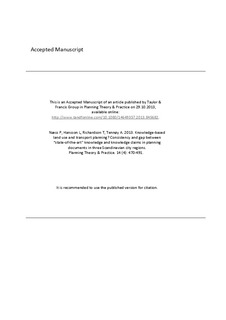| dc.contributor.author | Næss, Petter | |
| dc.contributor.author | Hansson, Lisa | |
| dc.contributor.author | Richardson, Tim | |
| dc.contributor.author | Tennøy, Aud | |
| dc.coverage.spatial | Norway | nb_NO |
| dc.date.accessioned | 2019-12-18T09:07:55Z | |
| dc.date.available | 2019-12-18T09:07:55Z | |
| dc.date.created | 2013-07-17T17:26:42Z | |
| dc.date.issued | 2013-10-29 | |
| dc.identifier.citation | Planning Theory & Practice. 2013, 14 (4), 470-491. | nb_NO |
| dc.identifier.issn | 1464-9357 | |
| dc.identifier.uri | http://hdl.handle.net/11250/2633827 | |
| dc.description.abstract | The central concern of this paper is the relationship between research-driven “state-of-the-art” knowledge, and knowledge claims made in practice, in planning for sustainability. The paper approaches this topic from a critical realist perspective, which is used to provide criteria for positing “state-of-the-art” knowledge validity, and assessing the quality of situated knowledge claims in planning practice. In this way the paper contributes to debates about an ontological turn in planning knowledge. By reviewing key planning documents in three Scandinavian city regions, the paper shows that the knowledge claims about travel behavioral impacts of proposed land use and transport infrastructure presented in the documents are, to varying extents, in accordance with “state-of-the-art” academic knowledge on these topics. Some long-standing “planning myths” are encountered in the investigated planning documents. In one of the cities, residential and workplace location close to suburban public transport stops is highlighted as a traffic-reducing measure, rather than proximity to inner-city concentrations of jobs and other facilities, and density is discussed at a neighborhood scale rather than at a city scale. In all three cities, planning documents depict road capacity increases as having no traffic-generating effect. These latter claims are used in support of more decentralized land-use patterns and considerable road development. Since the likelihood of achieving sustainability goals relies heavily on whether the measures chosen are productive or counter-productive, knowledge obviously matters. A stronger focus on how well suited proposed strategies for spatial development are to produce their purported outcomes should be welcomed in planning research and practice. | nb_NO |
| dc.language.iso | eng | nb_NO |
| dc.publisher | Taylor & Francis Group | nb_NO |
| dc.rights | Attribution-NonCommercial-NoDerivatives 4.0 Internasjonal | * |
| dc.rights.uri | http://creativecommons.org/licenses/by-nc-nd/4.0/deed.no | * |
| dc.title | Knowledge-based land use and transport planning? Consistency and gap between ‘state-of-the-art’ knowledge and knowledge claims in planning documents in three Scandinavian city regions | nb_NO |
| dc.type | Journal article | nb_NO |
| dc.type | Peer reviewed | nb_NO |
| dc.rights.holder | © 2013 Taylor & Francis | nb_NO |
| dc.description.version | acceptedVersion | nb_NO |
| cristin.unitcode | 7482,0,0,0 | |
| cristin.unitname | Transportøkonomisk institutt | |
| cristin.ispublished | true | |
| cristin.fulltext | postprint | |
| cristin.qualitycode | 2 | |
| dc.identifier.doi | 10.1080/14649357.2013.845682 | |
| dc.identifier.cristin | 1039354 | |
| dc.source.journal | Planning Theory & Practice | nb_NO |
| dc.source.volume | 14 | nb_NO |
| dc.source.issue | 4 | nb_NO |
| dc.source.pagenumber | 470-491 | nb_NO |

